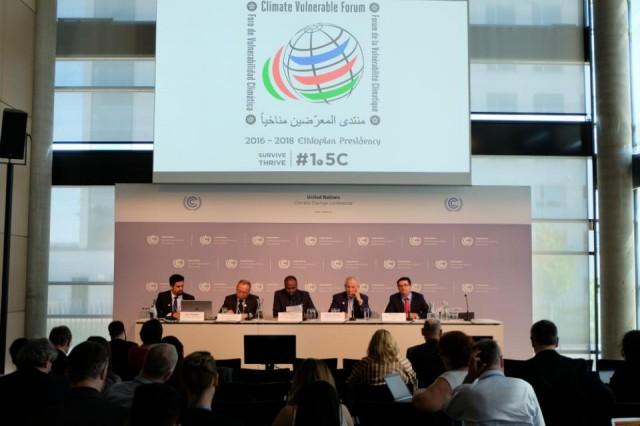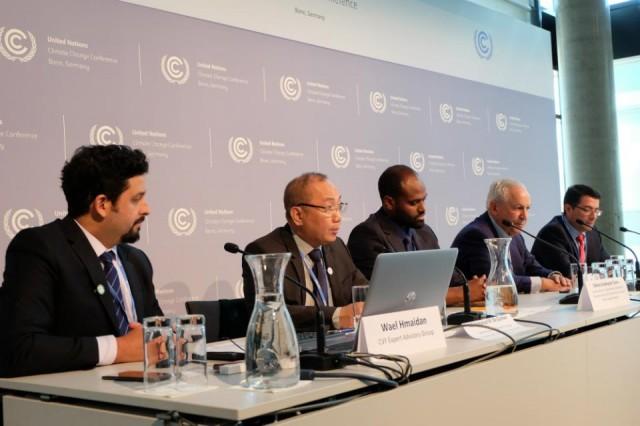BONN, Germany—The United Nations climate talks here are wrapping up today after almost two weeks. Within the next few hours, countries are expected to come up with at least a rough outline of a rule book for the Paris Agreement, which in turn seeks to limit global temperature increase to as much as 1.5 degrees Celsius.
The threat of the United States’ withdrawal from the landmark deal still hangs over the negotiations, but many other countries, big and small, have pushed back, including the Philippines.
'No country can ever be great again'
“Without increased climate action, no country can ever be great again,” said Climate Change Commissioner Emmanuel de Guzman, this week’s head of the country’s delegation to Bonn, in yesterday’s press conference of the Climate Vulnerable Forum (CVF), which declared the Paris Agreement as their “lifeline”.
The commissioner declined to single out the United States, but the reference to Donald Trump’s campaign slogan was hard to miss.
“CVF commissioned research has shown, for instance, that 1.6 degrees [Celsius] is the best scientific estimate for when the Greenland ice sheet would enter irreversible long-term decline, raising sea levels by several meters. Two degrees of warming will also double the length of extreme heat waves in the tropical regions in such a few decades,” said Director General Debasu Bayleyegn Eyasu, an official of Ethiopia’s climate ministry. The African country is the current chair of the 48-member-strong coalition of developing countries which are among the most vulnerable to climate impacts.

“Warming beyond 1.5 degrees will also appreciably increase the prevalence of extreme storms that have already been capable of large-scale loss of life and cutting a year’s GDP in half for some of our members,” he added.
Fiji, another CVF member and the incoming chair of the annual UN climate conference happening again in Bonn in November, in fact was just spared by an out-of-season tropical cyclone a few days ago.
The case for renewable energy
Despite contending with these realities, it was the Forum which pledged last year to go for 100% renewable energy by 2050. Possibly the best case in point is Costa Rica, which proudly declared in the press conference that they want to improve their already ambitious Nationally Determined Contribution (NDC).
“Even now, Costa Rica produces 100% renewable energy most of the year. But we won’t stop there. We are working now with the transport sector and hope to export renewable power to our neighbors in central America,” said William Calvo, the country’s adjunct chief negotiator.
Several studies have been released showing that the world is still on track to overshooting the Paris Agreement goal of 1.5 degrees, current country climate pledges notwithstanding. It would therefore be interesting to see how even fellow CVF member countries like the Philippines can learn further from Costa Rica’s example.
But as Ambassador Aziz Mekouar of Morocco put it, “heroic transformation is not only happening in CVF countries - many other developed and developing actors and non-state actors such as local governments, cities and businesses are stepping up to the challenge with conviction, resolve and enthusiasm.”

China, India onboard with climate action
India’s and particularly China’s coal plant cancellations, as well as their renewable energy transitions, were cited by Climate Analytics as the main reasons why global emissions are still likely to go down by 2030.
Earlier this week, China and other participating countries at the One Belt, One Road forum issued a joint communique declaring that they “are determined to protect the planet from degradation, including through taking urgent action on climate change and encouraging all parties which have ratified it to fully implement the Paris Agreement.”
European Union officials also announced that the EU and China will hold a summit primarily on climate change in June 2 in Brussels.
The UN climate talks are likewise gearing up for a 2018 stocktake of actions, which will require countries to ramp up their existing climate pledges.
“We are also being approached to possibly handle and coordinate the global stocktake,” confirmed Climate Change Commissioner Vernice Victorio in an interview last week, when she headed the delegation. — Text and photos by Denise Fontanilla/TJD, GMA News
Denise M. Fontanilla is the climate policy coordinator of the Institute for Climate and Sustainable Cities.



